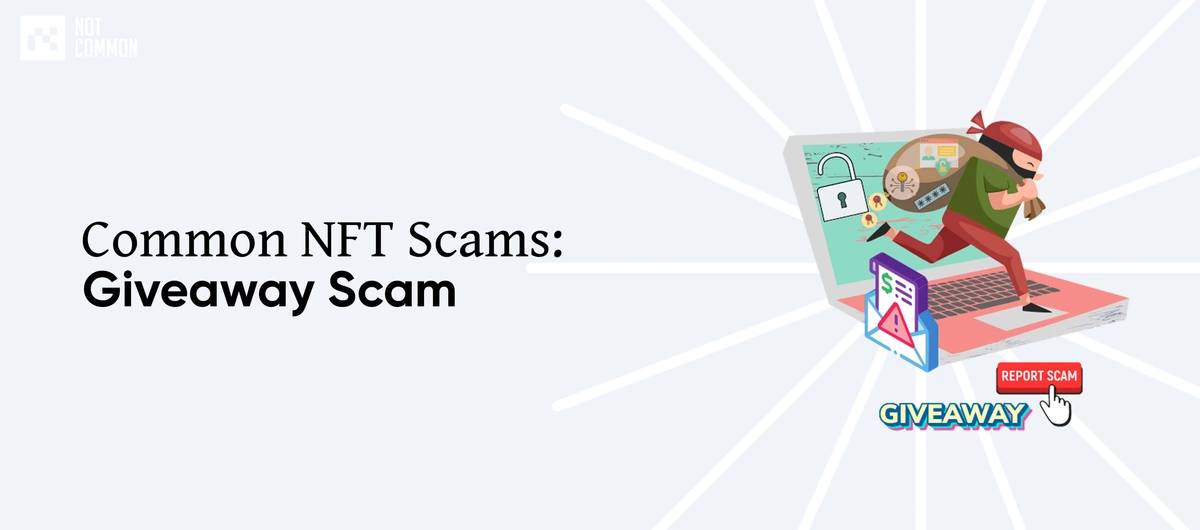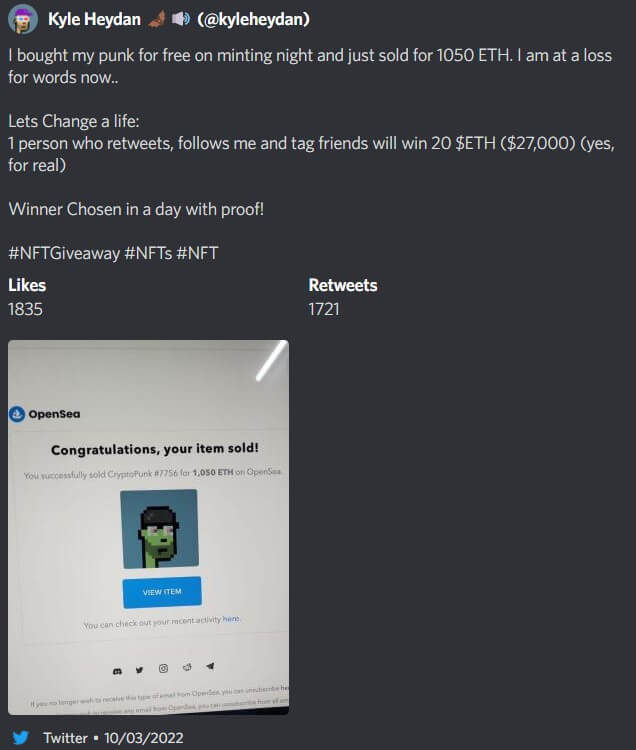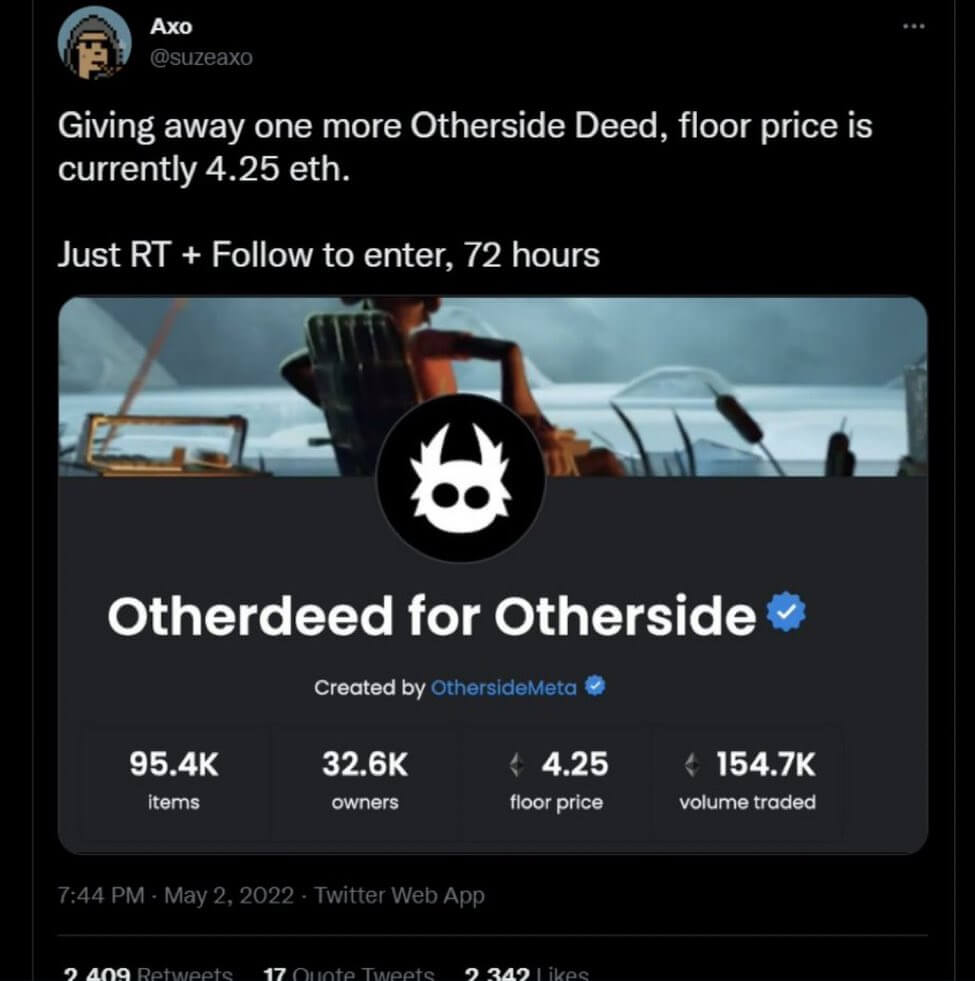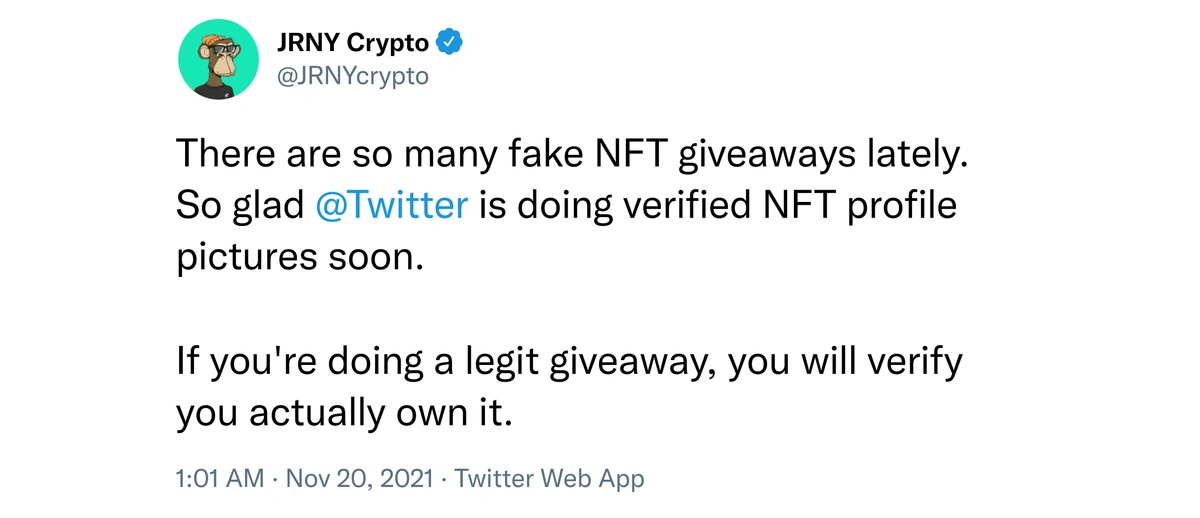The growing popularity of NFTs has significantly increased NFT giveaways in 2022. Everyone, from brand-new NFT projects to whales and influencers, hosts NFT giveaways to offer their followers valuable NFT assets. For creators, influencers, and projects, NFT giveaways serve to increase community engagement. Whereas for NFT collectors and investors, a giveaway is a great way to get started on valuable NFT projects, whether searching for a quick buck or becoming part of an NFT community. The surge in NFT giveaways has piqued the interest of NFT scammers seeking to capitalize on this emerging market.
Since the last significant bull run in late 2017, NFT giveaway scams have been an issue for NFT collectors and investors participating in the community. We strongly advise all our users to educate themselves on ongoing common NFT scams and how to spot them, regardless of whether they are seasoned investors or just starting their journey in the NFT space.
Scammers frequently use fake social media accounts to impersonate legal NFT trading platforms or influencers to spread information about NFT giveaway campaigns. Such giveaway scams can be very costly for novice NFT investors if they are not careful.
This article will discuss the giveaway scam, which is now becoming a popular choice among NFT scammers. It will further guide you on how to spot an NFT giveaway scam so you may avoid getting scammed.
What are Giveaway Scams?
A "NFT giveaway scam" is a social engineering technique that scammers frequently use to trick NFT collectors and investors into thinking that a popular NFT marketplace or influencer is hosting a giveaway when, in reality, the scammer is just attempting to steal their money. The catch here is that to enter the giveaway, you must pay a specific amount of cryptocurrency to a giveaway (scam) address to validate your wallet address and claim your NFT.
Alternatively, this may work so that the scammers will use hacked or fake social media accounts to promote alleged "NFT giveaways" links to fake NFT marketplaces or wallets. Once the NFT collectors click on the malicious link, their NFT wallet’s secret phrase or “seed phrase” is exposed to scammers.
In either case, if the scammers successfully scam NFT collectors through an NFT giveaway scam, the NFT collector may lose a lot of money in the form of NFT assets or cryptocurrency tokens.
In the first case, a victim may transfer cryptocurrency to the scammer’s wallet address. Once the victim transfers the money, there is no way to retrieve it, and the scammers steal the cryptocurrency tokens since cryptocurrency transactions are irreversible.
An example of an NFT giveaway scam. (Source: Twitter)
In celebration of new NFT project launches, giveaways often enable winners to immediately add potential NFTs to their wallets and profit from giveaways. Free NFTs help spread awareness of and enthusiasm for the token within a particular community. The free NFTs are also an attempt to get people to sign up for the NFT project. In the long run, both parties benefit from this. Scammers use this knowledge to create fake hype and promote malicious links as "NFT giveaways" on social media platforms, including Twitter.
NFT giveaway scam for Otherdeeds NFTs. (Source: Twitter)
Besides top NFT influencers, scammers may also impersonate blue-chip NFT projects to mislead NFT collectors and trick users into losing their valuable NFT assets. Similarly, scammers may fake prominent NFT marketplaces such as OpenSea and Rarible to promote fake giveaways and scam users.
Rarible Giveaway Scam:
Not long ago, scammers targeted the famous NFT marketplace Rarible in a giveaway scam when they started promoting a fake giveaway link on social media.
NFT Marketplace Rarible Giveaway Scam. (Source: Checkphish)
The Rarible giveaway scam used a phishing website to mislead users into spending 500 RARI cryptocurrency tokens to have a chance of winning 25,000 RARI tokens.
Luckily, CheckPhish.ai could spot the giveaway scam as a potential phishing attack and alerted NFT collectors and investors who spread the word about it.
Types of NFT Giveaway Scams:
All NFT giveaway scams use some social engineering technique; however, giveaway scams may differ in the medium that scammers use to promote them. The most prevailing platform for giveaway scammers is Twitter, where scammers continuously target unsuspecting investors and mislead them by stealing their NFT assets.
Other common platforms among giveaway scammers include Discord and YouTube. On Discord, scammers will either share their tweets on the server (to avoid suspicion), as shown in the image above, or share malicious links with creative messages to trick users.
Similarly, YouTube is one of the NFT scammers' favorite platforms for the sheer volume of people that use YouTube to learn about NFTs and giveaways. Scammers often post creative videos on YouTube posing as famous NFT marketplaces or projects to promote phishing links.
The Takeaway – How to Avoid Fake NFT Giveaways?
Giveaway scams have become commonplace in the NFT space due to the high volume of new projects and NFT collections entering the NFT market every month.
Tweet by BAYC Collector and NFT Influencer JRNY Crypto. (Source: Twitter)
Such NFT scams raised many concerns in the NFT community around late 2021 when influencers, artists, and significant NFT projects highlighted the issue. To combat the growing problem of giveaway scammers on Twitter, the social media platform eventually asked NFT collectors to prove that they owned any NFT project if they wanted to host its giveaway. However, scammers can still find ways around Twitter updates and continue tricking users on the platform.
Since you're now aware of the methods that giveaway scammers are using, there are two guidelines we hope you'll keep in mind to assist you in avoiding falling for their schemes in the future:
- It probably is if an offer or promise seems too good to be true.
- Be careful before transferring any cryptocurrency to an unknown wallet address since you may not be able to undo a cryptocurrency transaction or get your money back after you have sent it.
At NotCommon we created a way our users can help safeguard the NFT community by reporting any giveaway scams related to collections out there via our Collection Reports Form.




